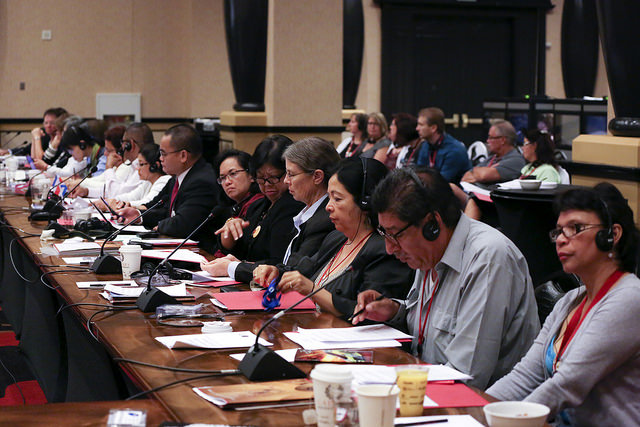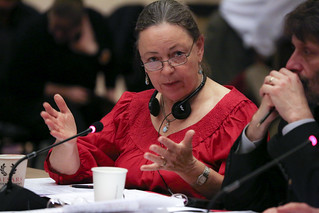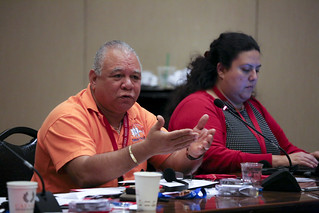Blog
Global Nurses Step Up Campaigns on Health Care, Climate Fight

With the multiple threats of attacks on health workers, efforts to privatize public health services, austerity budget cuts especially in health care, widening inequality, and the effects of the climate crisis including escalating epidemics, nurses around the globe are stepping up coordinated efforts to fight back.
In a meeting in Las Vegas September 19, top leaders of Global Nurses United, which includes 20 nurse and health worker unions from the Americas, Asia, Africa, Australia, and Europe, further cemented their alliance through solidarity efforts on domestic health care battles and international work on harmful trade deals, the climate crisis, and confronting the Ebola outbreak.
Formed in June, 2013, GNU continues to grow, adding new members at the Las Vegas meeting, nurse unions from Greece, Kenya, Paraguay, Taiwan, Uruguay and the Dominican Republic, and adopting a founding constitution. The GNU now has 20 affiliates from 18 countries.
“We know there’s an agenda that the health care corporations have, that Wall Street has, that the financial sector has, to take as much profit from public services as possible and to have that wealth transferred to themselves,” said RoseAnn DeMoro, executive director of National Nurses United, the U.S. “founding mother” of GNU, as she put it in a new video on GNU.
“That’s an international agenda and we have to have an international organization to offset that,” DeMoro said.
In Las Vegas, GNU leaders described the scope of what they confront at home in challenges that are key GNU priorities, from the campaigns for safer patient care especially with mandatory nurse-to-patient ratios, to challenging austerity, privatization, and the effects of the climate crisis and corporatization.
Julio Cesar García Cruceta, general secretary of the Sindicato Nacional de Trabajadores de Enfermeria of the Dominican Republic, reported how nurses and health workers have challenged the government of the Dominican Republic to act on issues  “affecting safe care for the Dominican society.”
“affecting safe care for the Dominican society.”
Judith Kjeda, Assistant General Secretary of the New South Wales Nurses and Midwives’ Association, described rollbacks in hospital staffing from the new conservative government in Australia and how nurses across the country are holding actions to push for safer staffing, including nurse to patient ratios.
From South Korea, Ji-Hyun Yoo, President of the Korean Health and Medical Workers Union, outlined the way nurses are promoting a Korean law for nursing ratios.
The delegates at the GNU meeting joined together in calling on South Korean President Park, Keun-Hye to “stop her policy of “privatization of healthcare, including conversion of the public healthcare delivery system to private schemes and introducing a system of ‘remote patient care’ (also known as ‘tele-medicine’)…and recruiting foreign patients as an excuse to further privatize the healthcare system, and increased pressure to generate profit from healthcare.” The delegates further gave support to the KHMU’s campaign to re-open the Jinju Medical Hospital and end the attack on South Korea’s public pension system.
Roberto Bomba, Treasurer of the Fédération interprofessionnelle de la santé du Québec, talked about the fight for RN ratios in Quebec, Canada, and cited what RNs in Quebec have learned from the experiences of California RNs who won the first ratio law in the U.S.
Maria Concepcion Chavez, President of Asociación Paraguaya de Enfermería, told about serious staffing shortages in new heath facilities across Paraguay that have resulted in widespread work load problems for nurses that put patients at risk.
Juan Andres Mastandrea Caballero, General Secretary of Sindicato Unico de Enfermeria del Uruguay, reported on the spreading use of technology being used to replace nursing staff in Uruguay.
 Guatemala has among the most severe conditions for health workers. Luis Lara Ballina, General Secretary of Sindicato Nacional de los Trabadores de Salud de Guatemala, reported widespread shortages of provisions for vaccinations, medications, surgical materials, while health workers go unpaid. Nurses and health workers have responded with multiple mobilizations, he noted, and been met with rightwing threats.
Guatemala has among the most severe conditions for health workers. Luis Lara Ballina, General Secretary of Sindicato Nacional de los Trabadores de Salud de Guatemala, reported widespread shortages of provisions for vaccinations, medications, surgical materials, while health workers go unpaid. Nurses and health workers have responded with multiple mobilizations, he noted, and been met with rightwing threats.
In support of the Guatemalan struggle, GNU delegates adopted a statement of solidarity voicing concern for the deteriorating conditions for health workers as well as a growing food shortage and high level of malnutrition in the country. “For each ten children,” it noted “eight suffer chronic malnutrition which affects their brain development, learning capacity and physical development.”
The statement also called on the Guatemalan President, Congress, and other leaders to support a Robin Hood tax on financial speculation that would “provide economic resources to support the strengthening of community health clinics” as well as “strengthening Guatemala’s public health system.”
NNU’s Ken Zinn described the growing global campaign for a Robin Hood tax, which is a GNU priority.
Climate change and the Ebola fight
GNU delegates embraced the growing global movement to confront the climate crisis. In a presentation to the union leaders, Sean Sweeney, co-director of the Cornell Global Labor Institute, noted “the climate crisis is a health crisis.”
Health effects include the direct consequences of extreme weather events like storms, wildfires, and droughts, to what he called “secondary effects,” including skin cancers, dengue fever, malaria, higher asthma rates, and diarrhea and malnutrition which lead to stunted growth among children.
“Disaster happens fast and deep, and we need a much broader vision,” said DeMoro. One response, she noted, is NNU’s Registered Response Network, which, after Typhoon Haiyan/Yolanda, a storm intensified by higher deep ocean temperatures, ravaged the Philippines, sent RN volunteers to provide basic medical aid.
RNRN director Bonnie Castillo, RN, described that effort, carried out in collaboration with GNU partner, the Alliance of Health Workers in the Philippines.
The current project for RNRN is collecting assistance for the rapidly spreading Ebola outbreak in West Africa, which also has a climate connection, principally through deforestation and drought.
RNRN has received a donation of 1,000 Hazmat suits from a U.S. manufacturer, that will be heading to West Africa, and is also requesting donations for more protective suits for nurses and other health workers who have been infected and died in what the World Health Organization calls “unprecedented” numbers.
At the GNU meeting, the Canadian Federation of Nurses Union announced a donation of $33,000 for RNRN’s effort, and other delegates pledged to support the campaign as well, including a response to financial assistance from the Liberian health workers union.
GNU leaders then adopted recommendations on how to escalate the voice of GNU and nurses in the international climate fight, as well as resolutions on the threat to worker’s rights posed by pending global trade pacts, including the Trans-Pacific Partnership Agreement, and a letter to the UN High Commissioner for Human Rights on the ongoing Detroit water crisis.
Next, GNU members will hold actions in Brisbane, Australia in November in concert with an upcoming meeting of G20 national leaders, and actions next May in conjunction with international nurses’ week.